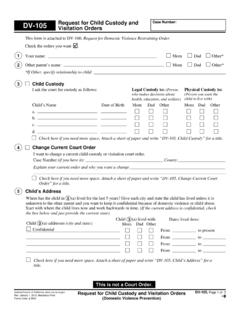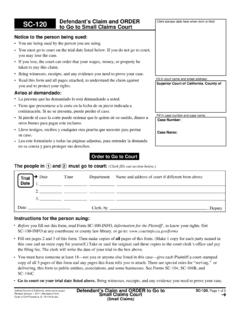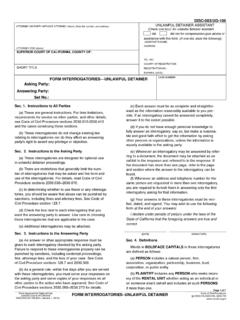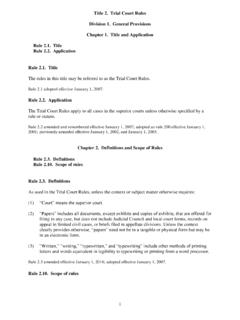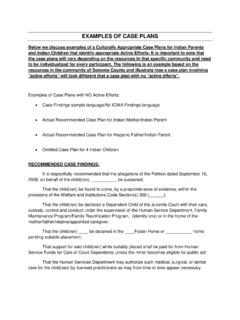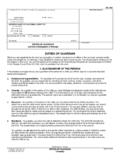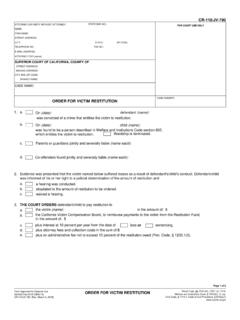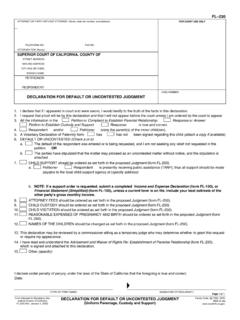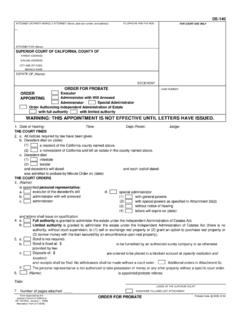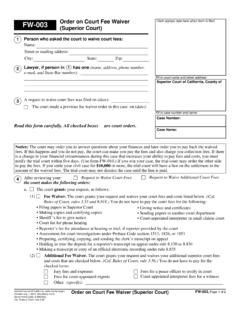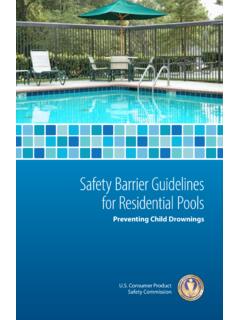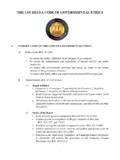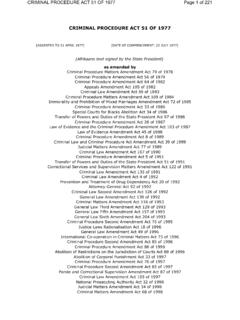Transcription of Domestic Violence and Child Custody - California
1 Revised January 1, 2022 If there has been Domestic Violence ( Domestic abuse or partner abuse) in your family, a special law may apply to your case. What is Domestic Violence ? It means to hit, kick, scare, throw things, pull hair, push, follow, harass, sexually assault, or threaten to do any of these things. It also includes other actions that make someone afraid of being hurt, isolated or unable to get to basic things, like food. Domestic Violence can be spoken, written, or physical. For more information on what Domestic Violence is, read form DV-500-INFO, Can a Domestic Violence Restraining Order Help Me? What is Child Custody ? There are two kinds: A person with physical Custody lives with the Child on a regular basis.
2 A person with legal Custody makes important decisions about the Child s health care, education, and welfare. When does Domestic Violence affect my case? In the last 5 years, has a parent in this case: 1. Had a conviction in criminal court for Domestic Violence against one of the following people: The other parent in the Custody case; Any of your children or your children s siblings; Their current spouse, or someone they are currently dating, engaged to, or living with; or Their parent (your Child s grandparent)? 2. Had a judge decide that they committed Domestic Violence against any of the people listed above ? (Example: a judge granted a restraining order against the parent after people testified and gave evidence.)
3 If you answered yes to 1 or 2, a special law applies to your case. This special law is sometimes called 3044 (see page 2 for the entire law). If someone is not your Child s parent and is asking the court for Custody , this law applies to them, too. Even if 3044 does not apply to your case, you should give the judge any information about Domestic Violence or abuse that you think can help the judge decide who gets Custody . How 3044 affects your case The judge can give Custody to a person who has a Domestic Violence conviction or decision against them only if the judge believes that it is in the Child s best interest to do so. The judge must look at 8 factors: 1.
4 What is in the Child s best interest? 2. Has the person committed any other Domestic Violence ? 3. Has the person followed all the terms and conditions of any restraining order? 4. Has the person finished a 1 year batterer intervention program? 5. Has the person finished an alcohol or drug program, if ordered by the judge? 6. Has the person finished a parenting class, if ordered by the judge? 7. If on probation or parole, has the person followed all terms of probation or parole? 8. Does the person still have a firearm (gun) or ammunition, in violation of a restraining order? The judge must go through this 8-factor test in every case that it applies to , even if a court professional or evaluator makes a recommendation in your case.
5 To learn more about the Custody process in family court, visit -know-about- Child - Custody -parenting-time . Domestic Violence and Child Custody Revised January 1, 2022 Family Code section 3044 (a) Upon a finding by the court that a party seeking Custody of a Child has perpetrated Domestic Violence within the previous five years against the other party seeking Custody of the Child , or against the Child or the Child s siblings, or against a person in subparagraph (A) of paragraph (2) of subdivision (a) of Section 3011 with whom the party has a relationship, there is a rebuttable presumption that an award of sole or joint physical or legal Custody of a Child to a person who has perpetrated Domestic Violence is detrimental to the best interest of the Child , pursuant to Sections 3011 and 3020.
6 This presumption may only be rebutted by a preponderance of the evidence. (b) To overcome the presumption set forth in subdivision (a), the court shall find that paragraph (1) is satisfied and shall find that the factors in paragraph (2), on balance, support the legislative findings in Section 3020. (1) The perpetrator of Domestic Violence has demonstrated that giving sole or joint physical or legal Custody of a Child to the perpetrator is in the best interest of the Child pursuant to Sections 3011 and 3020. In determining the best interest of the Child , the preference for frequent and continuing contact with both parents, as set forth in subdivision (b) of Section 3020, or with the noncustodial parent, as set forth in paragraph (1) of subdivision (a) of Section 3040, may not be used to rebut the presumption, in whole or in part.
7 (2) Additional factors: (A) The perpetrator has successfully completed a batterer s treatment program that meets the criteria outlined in subdivision (c) of Section of the Penal Code. (B) The perpetrator has successfully completed a program of alcohol or drug abuse counseling, if the court determines that counseling is appropriate. (C) The perpetrator has successfully completed a parenting class, if the court determines the class to be appropriate. (D) The perpetrator is on probation or parole, and has or has not complied with the terms and conditions of probation or parole. (E) The perpetrator is restrained by a protective order or restraining order, and has or has not complied with its terms and conditions.
8 (F) The perpetrator of Domestic Violence has committed further acts of Domestic Violence . (G) The court has determined, pursuant to Section , that the perpetrator is a restrained person in possession or control of a firearm or ammunition in violation of Section 6389. (c) For purposes of this section, a person has perpetrated Domestic Violence when the person is found by the court to have intentionally or recklessly caused or attempted to cause bodily injury, or sexual assault, or to have placed a person in reasonable apprehension of imminent serious bodily injury to that person or to another, or to have engaged in behavior involving, but not limited to, threatening, striking, harassing, destroying personal property, or disturbing the peace of another.
9 For which a court may issue an ex parte order pursuant to Section 6320 to protect the other party seeking Custody of the Child or to protect the Child and the Child s siblings. (d) (1) For purposes of this section, the requirement of a finding by the court shall be satisfied by, among other things, and not limited to, evidence that a party seeking Custody has been convicted within the previous five years, after a trial or a plea of guilty or no contest, of a crime against the other party that comes within the definition of Domestic Violence contained in Section 6211 and of abuse contained in Section 6203, including, but not limited to, a crime described in subdivision (e) of Section 243 of, or Section 261, , 422, or of, or former Section 262 of, the Penal Code.
10 (2) The requirement of a finding by the court shall also be satisfied if a court, whether that court hears or has heard the Child Custody proceedings or not, has made a finding pursuant to subdivision (a) based on conduct occurring within the previous five years. (e) When a court makes a finding that a party has perpetrated Domestic Violence , the court may not base its findings solely on conclusions reached by a Child Custody evaluator or on the recommendation of the Family Court Services staff, but shall consider any relevant, admissible evidence submitted by the parties. (f) (1) It is the intent of the Legislature that this subdivision be interpreted consistently with the decision in Jaime G.
